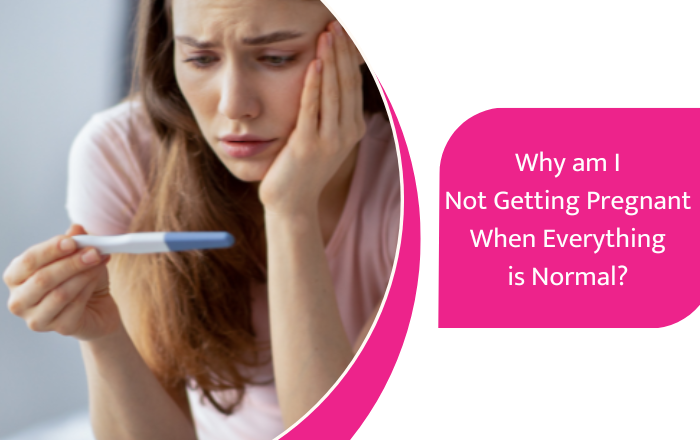Struggling to conceive can be an emotionally challenging journey, especially when all medical tests indicate everything is normal. If you’re asking yourself, “Why am I not getting pregnant when everything seems fine?”, you’re not alone. Many couples face this frustrating situation, often labeled as “unexplained infertility.” In this blog, we’ll explore potential reasons, possible solutions, and steps you can take to increase your chances of conceiving.
Understanding “Normal” Fertility Test Results
When doctors assess fertility, they usually look at several key factors:
- Ovulation: Regular ovulation cycles.
- Sperm health: A semen analysis to check sperm count, motility and morphology.
- Uterine health: Imaging tests to ensure there are no blockages or abnormalities in the reproductive tract.
- Hormonal balance: Normal levels of key hormones such as FSH, LH, oestrogen and progesterone.
However, ‘normal’ results do not guarantee conception. Fertility is a complex process and even with optimal test results there may be underlying challenges.
Possible Reasons for Difficulty Conceiving
Even if all the tests are normal, there are several factors that can make it difficult to conceive. Let’s break them down:
1. Unexplained infertility
This diagnosis is made when standard tests have failed to find an obvious cause. It accounts for up to 30% of infertility cases. Unexplained infertility doesn’t mean there isn’t a problem – it just means that current testing methods can’t pinpoint the cause.
2. Lifestyle factors
Stress: High stress levels can disrupt hormone production, affecting ovulation and sperm health.
Diet and weight: Being underweight or overweight can affect ovulation and reduce fertility.
Substance use: Smoking, alcohol and exposure to environmental toxins affect reproductive health.
3. Timing and frequency
Ovulation timing: Miscalculating your fertile window is more common than you think. Accurately tracking ovulation is key.
Frequency of intercourse: While timing is important, infrequent intercourse can reduce the chances of sperm meeting the egg.
4. Age-related factors
Age has a significant impact on fertility. Women experience a decline in egg quality and quantity after 35, while men may experience reduced sperm motility and genetic integrity after 40.
5. Subclinical medical problems
Mild endometriosis: Even subtle endometriosis can affect fertility without obvious symptoms.
Thyroid dysfunction: Both hypothyroidism and hyperthyroidism can affect conception.
Polycystic ovary syndrome (PCOS): Often undiagnosed in mild cases, PCOS can still interfere with ovulation.
6. Immune and genetic factors
Immune reactions: Some immune systems mistakenly attack sperm or embryos, preventing implantation.
Genetic abnormalities: Undiscovered chromosomal problems in one partner can make conception difficult.
7. Male Factor Fertility
Even if sperm count, motility, and morphology are normal, functional issues—like DNA fragmentation—can still impair fertility.
Read More Blogs – Yoga Poses That Help Boost Fertility
What You Can Do to Improve Your Chances
1. Consult a specialist
Seek the help of a reproductive endocrinologist or gynaecologist who specialises in fertility. A more detailed examination may reveal hidden factors.
2. Advanced tests
Hysteroscopy or laparoscopy: To check for uterine abnormalities or endometriosis.
Genetic testing: To identify chromosomal or inherited problems.
3. Lifestyle changes
Stress management: Practices such as yoga, meditation or counselling can reduce stress levels.
Diet: Focus on a balanced diet rich in folate, zinc and antioxidants.
Healthy weight: Aim for a BMI in the 18.5-24.9 range.
4. Alternative therapies
Although the evidence is mixed, some couples find success with
Acupuncture: May improve blood flow to the reproductive organs.
Herbal treatments: Consult a doctor before trying supplements.
5. Assisted reproductive technologies (ART)
Intrauterine insemination (IUI): Placing sperm directly into the uterus during ovulation.
In vitro fertilisation (IVF): Fertilising an egg in the laboratory and implanting it in the uterus.
Taking Care of Your Emotional and Mental Health
The emotional toll of infertility is significant. Consider these steps:
- Join Support Groups: Sharing experiences with others in similar situations can reduce feelings of isolation.
- Counseling: A therapist specializing in infertility can provide coping strategies.
- Focus on Your Relationship: Ensure open communication with your partner to navigate this journey together.
Not being able to conceive despite normal test results can feel disheartening, but it’s important to remember that you’re not alone. Many couples face similar challenges, and advances in fertility treatments mean that solutions are available. The key is to persevere, explore all options and seek expert advice.
If you’re in Moshi and looking for a trusted expert, Dr. Jyoti Kale, a highly regarded gynecologist, specializes in fertility care. With her compassionate approach and advanced expertise, she can help you explore solutions tailored to your needs. Don’t hesitate to book a consultation with her to start your journey towards parenthood.
FAQs on Why Am I Not Getting Pregnant When Everything is Normal
1. Can stress alone prevent pregnancy?
A: While stress itself does not directly cause infertility, chronic stress can affect hormone levels, disrupt ovulation, or reduce sperm production. Stress management techniques like yoga, meditation, or therapy can help improve your overall fertility health.
2. Could my partner have fertility issues even if his sperm test is normal?
A: Yes. Even with a normal semen analysis, there could be functional issues like DNA fragmentation, which standard tests do not always detect. Further specialized testing may be needed.
3. How does age affect fertility?
A: Age impacts both egg and sperm quality. Women experience a decline in egg quality and quantity after 35, and men may see reduced sperm motility and increased DNA damage after 40.
4. How can a gynecologist like Dr. Jyoti Kale help?
A: Dr. Jyoti Kale, a renowned gynecologist in Moshi, specializes in fertility evaluation and treatment. She can provide advanced diagnostics, personalized advice, and effective treatment plans to address your specific needs and increase your chances of conceiving.


